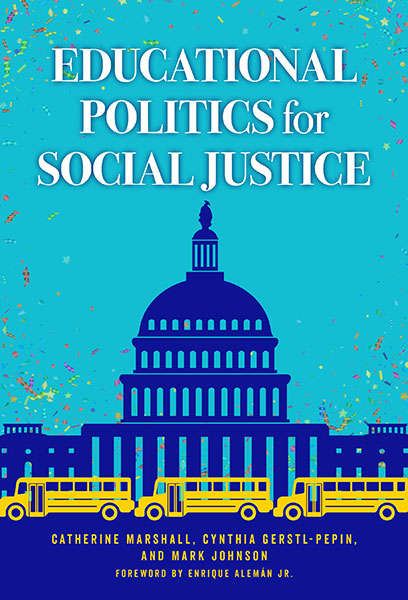Select an item by clicking its checkbox
Additional Info:
Employing a social justice framework, this book provides educational leaders and practitioners with tools and strategies for grappling with the political fray of education politics. The framework offers ways to critique, challenge, and alter social, cultural, and political patterns in organizations and systems that perpetuate inequities. The authors focus on the processes through which educational politics is enacted, illustrating how inequitable power relations are embedded in our democratic systems. Readers will explore education politics at five focal points of power (micro, local/district, state, federal, and global). The text provides examples of how to “work the system” in ways that move toward greater justice and equity in schools. (From the Publisher)
Table Of Content:
Foreword Enrique Aleman
Preface
Part I: Centering Justice in Educational Politics
1. Power, Democracy, and Social Justice Values
Introduction
Centering Justice: A Framework for Action
Power Dynamics and Control in Framing Policy
Who Defines Policy Problems?
Centering Justice: Valuing Democracy and Justice
Strategic Democratic Possibilities
Democratizing Politics and Centering Justice
A Centering Justice Oriented Analysis: An Example
Summary
Part ii: Multiple Arenas of Educational Politics
2. Micropolitics: “Hidden” Conflicts and Power
Introduction
Structural Power Dynamics
Sociocultural Power Dynamics
The Power of Micropolitics for Centering Justice
Centering Justice: A Curriculum with Two Kings
Summary
3. Democracy and Community in Districts?
Introduction
The Players on School Boards and in the Central Office
Ways to Look at District Politics and Policy
Expanding Agendas to Center Justice
Summary
4. State Policy Shifts and Cultural Idiosyncrasies
Introduction
Shifts in the Role of State Education Policy
Key State Policymakers, Arenas of Power, and Concepts of Analysis
Summary
5. Federal Policy Communities and Interest Groups
Introduction
Centering Justice: The Opt-Out Movement
Summary
6. Global Education Politics
Introduction
Actors, Arenas, and Structures for International Politics
Cross-National Comparisons of Education
Social Justice Approaches to the Comparative Education Policy
Relevant Questions for International Comparisons
Differing Contexts and Values Across Countries
International Sharing and Borrowing
Continuing Challenges and Controversies
Questions from Centering Justice Framing
Global Framing of Policy Discourse
Politics for Social Justice: Thinking Globally
Centering Justice: Greta Thunberg and “School Strikes for the Climate”
Summary
Part iii: Making Connections for Policy Action
7. Policy Webs, Pendulum Shifts, and Interconnections
Introduction
The Policy Web of Leadership
Pendulum Swings of Webs of Control, Values, and Priorities
The Paradox of Policy Intent and Unintended Consequences
The Paradox of Ignoring Race and Culture: The Immigrant Experience
Interweaving of National and International Politics
Unanticipated Consequences and Hidden Goals
Cross-Purposes, Stupidity, and Contradictions
Interrelationship Among Organizations and Interest Groups
Making Connections: Family-Centered Integrated Service
Systems and Schools
Centering Justice: Designing a School Around Caring
Relationships
Summary
8. Leading for Justice and Equity
Introduction
Exposing Inequitable Power and Injustice
Engaging Political Arenas
Centering Justice: Can a Superintendent Take a Stand?
Alternative Approaches for Leadership
Centering Justice in Educational Politics
Specific Tools for Centering Social Justice Leadership
Examine Advocacy Strategies
Summary
References
Index
About the Authors
Employing a social justice framework, this book provides educational leaders and practitioners with tools and strategies for grappling with the political fray of education politics. The framework offers ways to critique, challenge, and alter social, cultural, and political patterns in organizations and systems that perpetuate inequities. The authors focus on the processes through which educational politics is enacted, illustrating how inequitable power relations are embedded in our democratic systems. Readers will explore education politics at five focal points of power (micro, local/district, state, federal, and global). The text provides examples of how to “work the system” in ways that move toward greater justice and equity in schools. (From the Publisher)
Table Of Content:
Foreword Enrique Aleman
Preface
Part I: Centering Justice in Educational Politics
1. Power, Democracy, and Social Justice Values
Introduction
Centering Justice: A Framework for Action
Power Dynamics and Control in Framing Policy
Who Defines Policy Problems?
Centering Justice: Valuing Democracy and Justice
Strategic Democratic Possibilities
Democratizing Politics and Centering Justice
A Centering Justice Oriented Analysis: An Example
Summary
Part ii: Multiple Arenas of Educational Politics
2. Micropolitics: “Hidden” Conflicts and Power
Introduction
Structural Power Dynamics
Sociocultural Power Dynamics
The Power of Micropolitics for Centering Justice
Centering Justice: A Curriculum with Two Kings
Summary
3. Democracy and Community in Districts?
Introduction
The Players on School Boards and in the Central Office
Ways to Look at District Politics and Policy
Expanding Agendas to Center Justice
Summary
4. State Policy Shifts and Cultural Idiosyncrasies
Introduction
Shifts in the Role of State Education Policy
Key State Policymakers, Arenas of Power, and Concepts of Analysis
Summary
5. Federal Policy Communities and Interest Groups
Introduction
Centering Justice: The Opt-Out Movement
Summary
6. Global Education Politics
Introduction
Actors, Arenas, and Structures for International Politics
Cross-National Comparisons of Education
Social Justice Approaches to the Comparative Education Policy
Relevant Questions for International Comparisons
Differing Contexts and Values Across Countries
International Sharing and Borrowing
Continuing Challenges and Controversies
Questions from Centering Justice Framing
Global Framing of Policy Discourse
Politics for Social Justice: Thinking Globally
Centering Justice: Greta Thunberg and “School Strikes for the Climate”
Summary
Part iii: Making Connections for Policy Action
7. Policy Webs, Pendulum Shifts, and Interconnections
Introduction
The Policy Web of Leadership
Pendulum Swings of Webs of Control, Values, and Priorities
The Paradox of Policy Intent and Unintended Consequences
The Paradox of Ignoring Race and Culture: The Immigrant Experience
Interweaving of National and International Politics
Unanticipated Consequences and Hidden Goals
Cross-Purposes, Stupidity, and Contradictions
Interrelationship Among Organizations and Interest Groups
Making Connections: Family-Centered Integrated Service
Systems and Schools
Centering Justice: Designing a School Around Caring
Relationships
Summary
8. Leading for Justice and Equity
Introduction
Exposing Inequitable Power and Injustice
Engaging Political Arenas
Centering Justice: Can a Superintendent Take a Stand?
Alternative Approaches for Leadership
Centering Justice in Educational Politics
Specific Tools for Centering Social Justice Leadership
Examine Advocacy Strategies
Summary
References
Index
About the Authors
